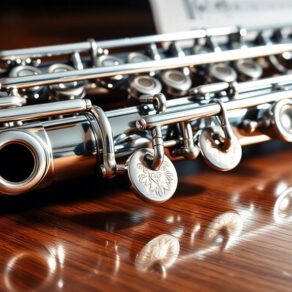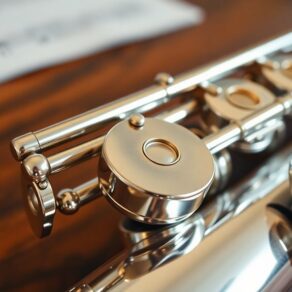To choose the right flute for your skill level, start by identifying the instrument type that suits your playing style. Beginners should consider closed-hole metal flutes for ease of play, while advanced players might prefer open-hole options for tonal flexibility. Assess material choices like metal for durability or wood for a warmer sound. Factor in your budget: beginner flutes usually range from $100 to $500, while higher quality models cost more. Finally, trust reputable brands like Yamaha or Pearl. Understanding these elements will help you select an instrument that aligns with your aspirations and needs. There's much more to explore on this topic.
Understanding Flute Types
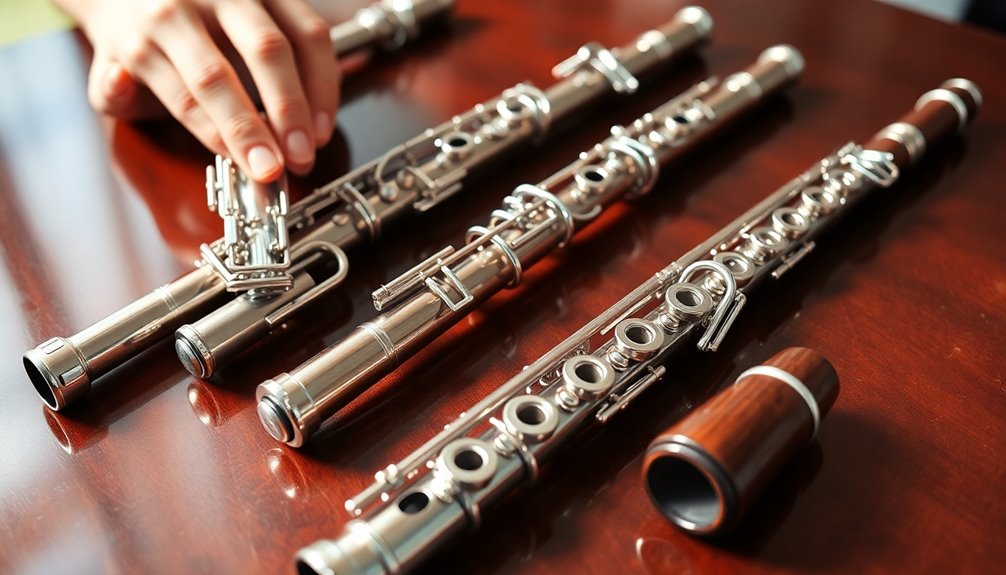
When exploring flute types, it's vital to evaluate how each variation influences your playing experience. Flutes have evolved remarkably throughout flute history, branching into multiple types that cater to different styles and preferences. By understanding these variations, you can find the perfect fit for your musical journey.
The most common types include the concert flute, piccolo, alto flute, and bass flute. The concert flute, typically made of metal, boasts a rich, versatile sound, making it ideal for orchestral and solo performances. In contrast, the piccolo, smaller and higher in pitch, offers a bright, penetrating tone, often used for accents in orchestral settings.
The alto flute, with its larger body, produces a softer, mellower sound, perfect for blending in ensemble pieces. Finally, the bass flute, an even lower option, provides a unique depth to harmonies and is less common but equally valuable. Furthermore, bass flutes are versatile instruments that fit well in jazz, classical, folk, and experimental music genres.
Understanding flute anatomy is also essential. Key placements, embouchure holes, and material choices all play a role in how a flute feels and sounds.
For instance, a flute with a wider embouchure hole may offer greater projection, while those with closed-hole keys can provide easier fingerings for beginners.
Factors to Consider
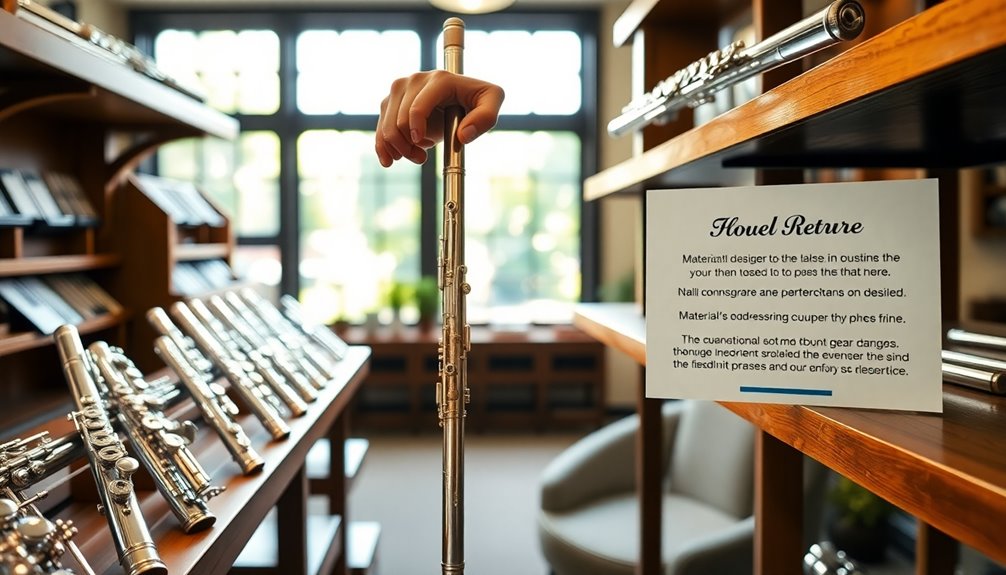
Choosing the right flute often hinges on several key factors that can greatly impact your playing experience. First, consider the flute sizes available. Flutes come in various dimensions, each affecting tone, playability, and comfort. If you're a beginner, a standard concert flute is often recommended due to its versatility and ease of use. However, if you have smaller hands or a unique body type, a smaller flute might suit you better.
Next, think about your playing style. Are you drawn to classical, jazz, or perhaps folk music? Each genre may have its preferred flute type. For instance, a jazz player may appreciate the flexibility of a curved headjoint, while a classical musician might opt for a straight headjoint for a more focused sound. Your choice of playing style will also influence the specific flute features you should prioritize, such as keys and pads.
Additionally, evaluate your current skill level and future aspirations. If you plan to progress quickly, investing in a higher-quality instrument could be beneficial. This decision can enhance your ability to explore different techniques and expand your repertoire. A flute with closed-hole keys can provide better support for finger placement, aiding in your technique development as a beginner.
Lastly, don't overlook the importance of comfort. You'll want a flute that feels good in your hands, allowing you to play with ease and confidence. By considering these factors—flute sizes, playing styles, and personal comfort—you'll be well on your way to selecting a flute that truly resonates with you.
Material Choices
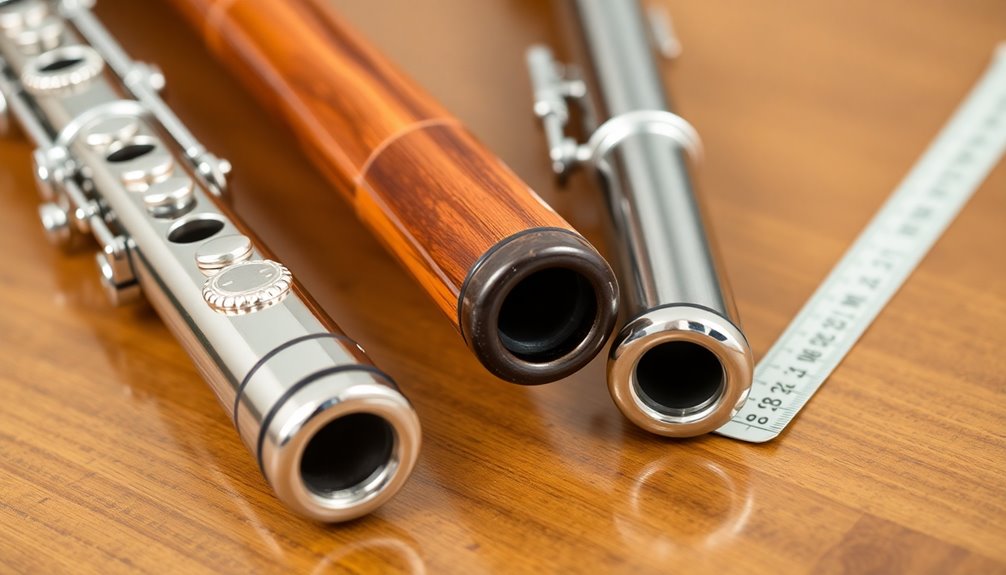
The material of your flute can greatly influence its sound quality, durability, and overall playability. When it comes to choosing between wood and metal, each option has its unique characteristics that cater to different skill levels and preferences.
For beginners, metal flutes are often the go-to choice. They're generally more affordable, robust, and easier to maintain. On the other hand, wooden flutes offer a warm, rich tone that some musicians find appealing, but they require more care and are typically pricier. Understanding these differences can help you make a more informed decision.
Here's a comparison to help you visualize the pros and cons:
| Material | Pros |
|---|---|
| Wood | Rich tone, unique sound |
| Lightweight, responsive | |
| Metal | Durable, easy to maintain |
| Bright, focused sound | |
| Great for beginners |
When selecting your flute, consider your long-term goals. If you're just starting out, a metal flute might be the best option to build your skills without worrying about the fragility of wood. However, if you're drawn to the warm sound of wood and are willing to invest time in care, don't shy away from exploring wooden options. Ultimately, the right material should resonate with your personal preferences and musical aspirations, creating a sense of belonging in your musical journey. Additionally, many metal flutes feature double-wall vacuum insulation, which helps maintain beverage temperature for those who might enjoy a drink while practicing.
Key Mechanisms
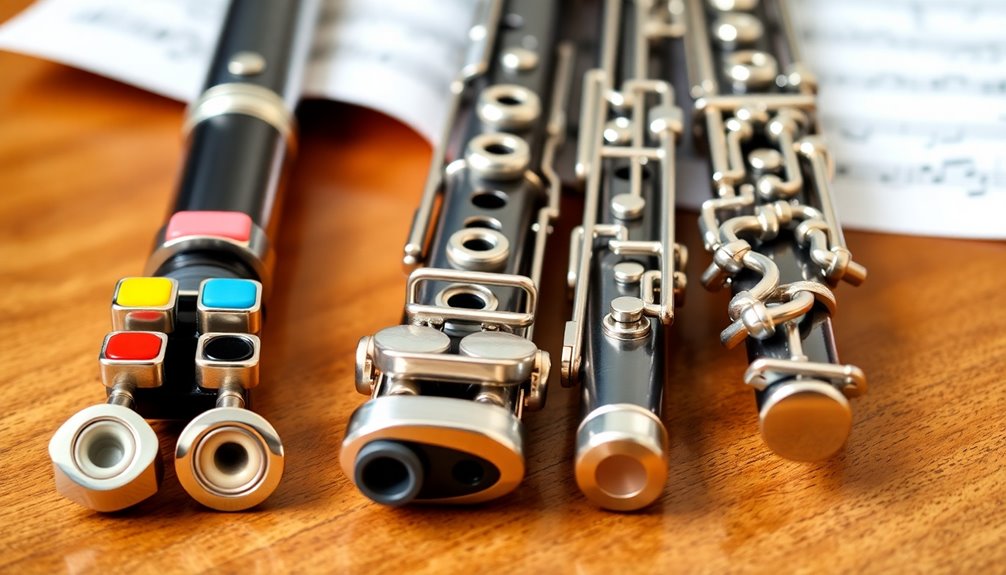
A variety of key mechanisms substantially affect how well a flute performs and how comfortable it's to play. Understanding these flute mechanics will help you make an informed choice. The most common key mechanism types are open-hole, closed-hole, and offset G.
Open-hole flutes have holes without covers, allowing for more nuanced fingerings and tonal flexibility. This design can be advantageous for advanced players who want to explore various techniques. However, if you're just starting out, these may pose a challenge, as finger placement is essential.
Closed-hole flutes, on the other hand, feature covered holes, making them easier for beginners. They provide a more forgiving playing experience, allowing you to focus on developing your skills without the added complexity of finger positioning. If comfort and ease of play are your priorities, a closed-hole flute might be your best option. Additionally, the ergonomic design features of closed-hole flutes help reduce strain during practice, making them ideal for long playing sessions.
Offset G key mechanisms are designed for ergonomic play. This setup positions the G key slightly to the side, making it easier for your fingers to reach. If you find that traditional key placements cause discomfort, consider opting for this design.
Ultimately, the choice of key mechanism will depend on your individual skill level and playing style. Weigh the benefits of each type against your needs to find a flute that feels right for you.
Price Ranges
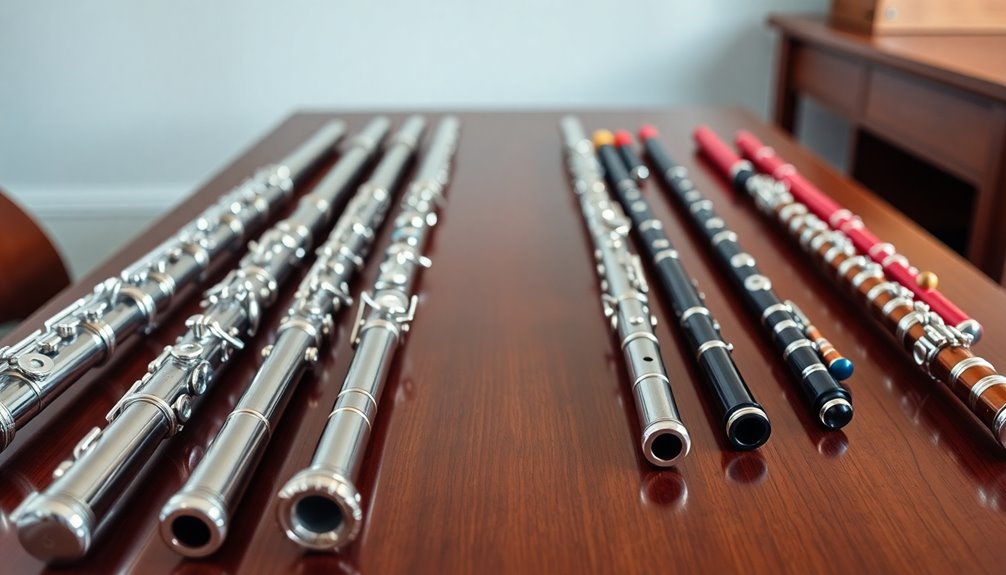
Maneuvering the price ranges of flutes is essential for making an informed purchase. Flutes generally fall into three primary categories: beginner, intermediate, and professional. Each category comes with its own price range, which can help you align your choice with your skill level and budget constraints.
For beginners, flutes typically range from $100 to $500. These instruments are often made of nickel or silver-plated materials and are designed to be durable and user-friendly. They usually come with basic flute accessories like cleaning rods and cases, ensuring you have what you need to get started. Additionally, choosing a flute from reputable brands like Yamaha Flutes can provide enhanced reliability and playability for novice players.
As you progress into the intermediate category, expect to pay between $500 and $2,000. These flutes often feature better construction, more advanced key mechanisms, and sometimes, solid silver bodies. The increase in price reflects the higher quality of sound and playability, making them a sound investment for developing musicians.
Finally, professional flutes range from $2,000 to upwards of $10,000. These instruments are crafted with precision and offer exceptional tonal quality. Many professionals seek out custom options or specialized flute accessories to match their unique playing style, further adding to the investment.
Regardless of your skill level, always consider your budget constraints and the long-term value of the instrument. Spending wisely now can lead to a more fulfilling musical journey, ensuring you find a flute that resonates with your aspirations and supports your growth.
Brand Recommendations
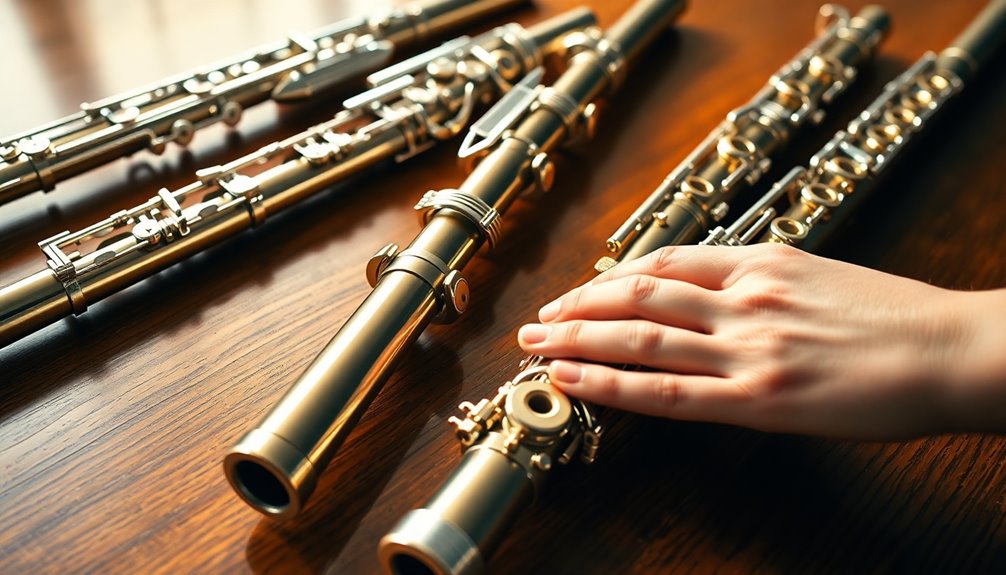
When you're ready to select a flute, considering reputable brands can greatly impact your choice and overall satisfaction. Various flute brands are recognized for their craftsmanship, reliability, and sound quality, making them ideal choices for players at any skill level.
Start by looking into top manufacturers like Yamaha, Pearl, and Gemeinhardt. Yamaha is renowned for producing flutes that cater to both beginners and advanced players. Their instruments often feature excellent intonation and a warm tone, making them a favorite among music educators.
Pearl, known for its innovative designs, offers flutes that not only sound great but are also durable. Their incorporation of the "Pinless Mechanism" guarantees smooth action and reliability, which is crucial as you progress in your playing.
Gemeinhardt is another brand worth considering, particularly if you're starting out. Their flutes are specifically designed for student players, providing a solid foundation for budding musicians. Each of these brands has a range of models, so you'll find options that fit your budget and playing style.
Moreover, investing in a flute from a top brand can ensure superior craftsmanship that enhances your playing experience and overall musicality.
As you explore these flute brands, remember that each has its unique strengths. It's important to align your choice with your personal preferences and playing goals. By opting for instruments from reputable companies, you're more likely to experience a satisfying musical journey, fostering a sense of belonging within the vibrant community of flute players.
Testing Before Buying
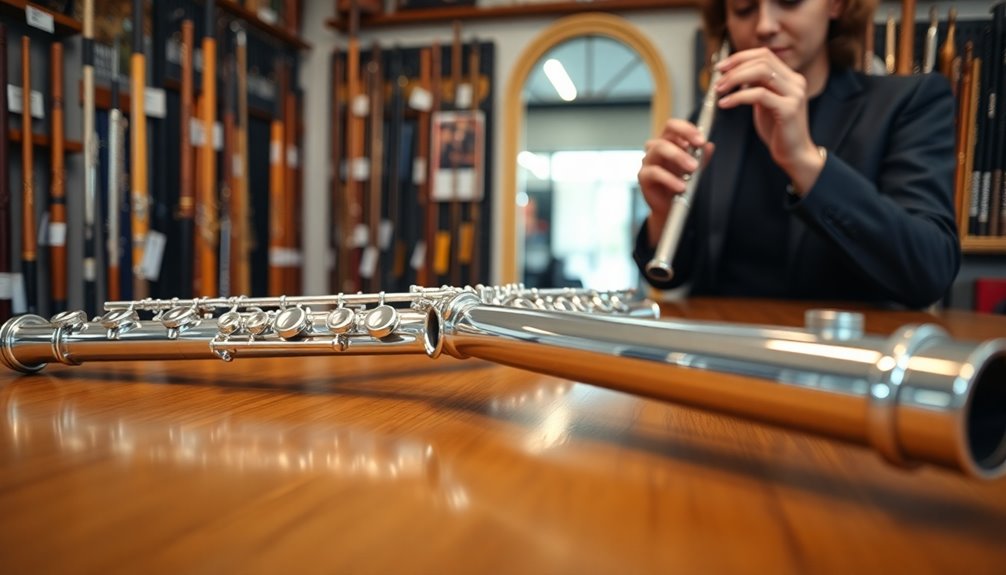
Selecting the right flute from reputable brands is just the beginning; testing the instrument before making a purchase is equally important. Test playing allows you to gauge how the flute feels and sounds in your hands. Each flute has its unique character, and what works for one player might not suit another. Consequently, engaging in sound comparison is essential to find the right match for your playing style.
When you visit a store, consider using the table below to help you evaluate your options:
| Feature | Flute A | Flute B |
|---|---|---|
| Comfort Level | Excellent | Good |
| Sound Quality | Bright and clear | Warm and rich |
| Response Time | Quick | Moderate |
As you test play different flutes, pay attention to how comfortable you feel while holding and playing each instrument. Notice the sound quality; does it resonate with you? A bright sound might be perfect for classical pieces, while a warm tone could be better suited for jazz. You should also assess the response time; a quick response allows for more expressive playing. Additionally, consider the flute's design and ergonomics, as these factors can significantly affect your overall playing experience.
Incorporating these elements into your decision-making process will help you find a flute that not only meets your technical needs but also feels like a true extension of yourself. Remember, it's not just about the brand; it's about finding the right fit for your musical journey.
Maintenance Tips
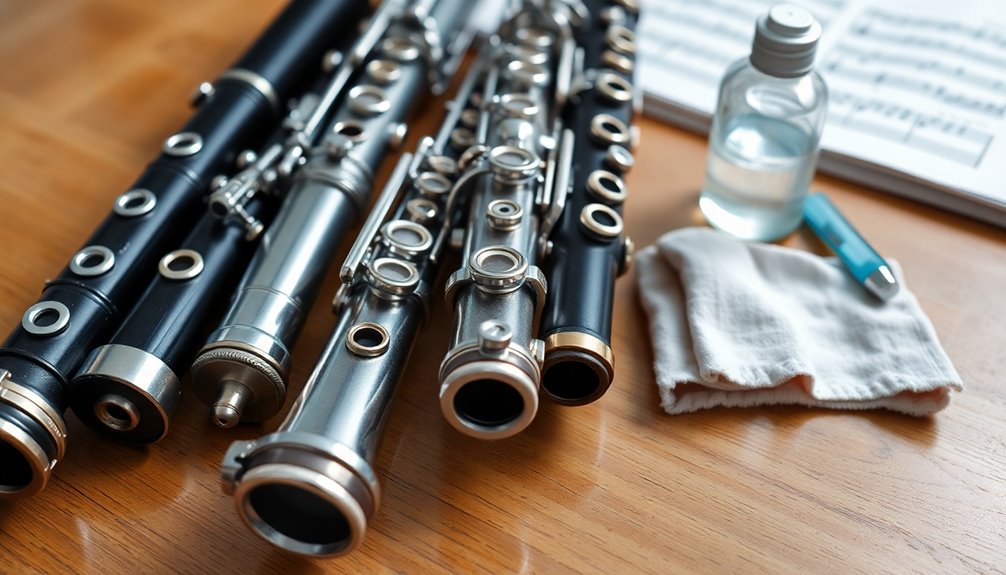
Proper maintenance is essential for ensuring your flute remains in ideal playing condition and lasts for years to come. To achieve this, you'll need to adopt effective cleaning techniques and conduct regular inspections.
Start with daily cleaning. After each practice session, gently swab the inside of your flute using a cleaning rod and cloth. This removes moisture that can lead to corrosion and buildup.
For the exterior, use a soft, lint-free cloth to wipe away fingerprints and oils. Avoid using any harsh chemicals that could damage the finish.
Regular inspections are equally important. At least once a month, check for any signs of wear or damage, such as loose keys or pads that aren't sealing properly.
If you notice any issues, it's best to consult a professional technician to avoid escalating problems.
Additionally, consider the environment where you store your flute. Keep it in a protective case to shield it from dust and temperature fluctuations.
Avoid leaving it in places with high humidity or direct sunlight, as these can adversely affect its materials. Regularly inspect for signs of damage to ensure your instrument remains in optimal condition.
Finally, don't forget to check your flute's pads periodically. Over time, they can wear down, affecting sound quality.
If you're unsure about their condition, a professional can provide guidance and necessary repairs.
Frequently Asked Questions
Can I Play a Flute With Braces?
Yes, you can definitely play the flute with braces!
While it might feel a bit uncomfortable at first, most players adjust quickly. You may experience some changes in your playing techniques due to braces adjustments, so be patient and give yourself time to adapt.
Focus on your embouchure and airflow, and don't hesitate to consult your orthodontist or a flute teacher for tips tailored to your situation.
You'll find your groove in no time!
What's the Best Age to Start Learning Flute?
They say, "The earlier, the better." Starting to learn the flute can greatly benefit child development, as it fosters discipline, coordination, and musical interest.
While there's no perfect age, many children begin around 8 or 9 years old. At this age, their motor skills and cognitive abilities are more developed, making it easier to grasp concepts.
Ultimately, if you or your child shows a passion for music, it's never too early to start!
How Often Should I Practice to Improve?
To improve, you should focus on practice frequency and effective techniques. Aim for at least 30 minutes a day, five days a week.
Consistency builds muscle memory and enhances your skills. Incorporate warm-ups, scales, and pieces you enjoy to keep motivation high.
Don't forget to set specific goals for each session; this'll help you track progress and stay engaged.
Can I Use a Beginner Flute for Advanced Playing?
Think of your flute as a canvas; a beginner flute has its limitations, much like a starter brush.
While you can technically use it for advanced playing, the instrument may not respond well to complex techniques.
You'll likely find that certain advanced techniques are challenging to execute.
To truly express your musical vision, consider upgrading to a more advanced flute.
This way, you can release your full potential and feel more connected to your craft.
What Accessories Do I Need for My Flute?
To get the most out of your flute, you'll need some essential accessories.
Start with essential cleaning supplies like a cleaning rod, cloth, and swabs to keep your instrument in top shape. Regular maintenance is vital, so consider flute maintenance tips, such as wiping down the keys and using a pad dryer.
These tools not only enhance your playing experience but also help you feel more connected to your flute and your musical journey.
Conclusion
Choosing the right flute isn't just about picking an instrument; it's about aligning it with your skill level and musical aspirations. By understanding the various types, materials, and mechanisms, you can make an informed choice that enhances your playing experience. Remember, investing in a quality flute can greatly impact your growth as a musician. Ultimately, the right flute becomes an extension of yourself, allowing you to express your unique voice and creativity in music.



